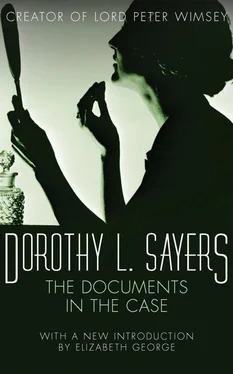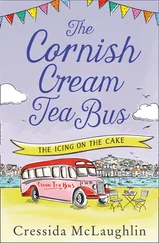‘But you will admit that murder was being urged upon him, in various ways, in all these letters.’
‘I wouldn’t necessarily go so far as to admit that. Mrs Harrison is an emotional, imaginative woman. She picks up phrases out of books. Plenty of people talk in this vague way about love — about its being supreme, and justifying itself, and sweeping obstacles aside and so on, without ever intending to put their words into action. I’ve written that kind of thing myself — in books.’
‘Very likely. As a modern novelist you need not be expected to uphold a high standard of morals. But in practice, I take it, you would not wish to excuse or justify murder.’
‘No. I confess to an old-fashioned prejudice against murder. It may be inconsistent of me, but I do. And so, I am sure, would Lathom.’
‘Lathom is obviously very much under the influence of Margaret Harrison.’
‘I should have said it was the other way round.’
‘In some things. In theory, no doubt. But when it comes to doing things, I should say she was infinitely more practical — and more unscrupulous. But say, if you like, he is only under the influence of a strong passion — don’t you think that might lead him to do things which conflicted with his principles, or prejudices, or whatever you like to call them? Come now, you have called me a man of the world. Murders are done every day, for much less motive than Lathom had.’
He drummed on the table.
‘Well,’ he burst out at last. ‘I’ll admit that. I’ll admit — for the sake of argument — that Lathom might have murdered your father, though I don’t believe it for a moment. But it was physically impossible. How could he? He was here in London all the time.’
‘That’s where you can help me. Why was it impossible? How do you know it was impossible? Can you prove that it was impossible?’
‘I’m sure I can.’
‘Will you let me have all the facts you know about the whole thing from the beginning?’
‘Of course I will. Damn it all, if Lathom did do it, he deserves everything that’s coming to him. He’d have to be an absolute swine. Mind you, Lathom and I didn’t always get on together, but — it’s absurd. He can’t have done it. But we’ve got to kill the possibility.’
He began to walk up and down, visibly perturbed. I waited. We were interrupted by a servant announcing dinner.
‘You’ll stay?’ said Munting. ‘You must meet my wife. She has a very clear head for this kind of thing.’
I accepted, not wishing to lose a day in getting to the bottom of the matter. We did not, of course, talk about the subject while the maid was in the room, but after dinner we all went into the library, and there outlined the story to Mrs Munting. I mention her, not because she was able to contribute anything of great value to the discussion (though, being a woman, she was more willing than her husband to allow that a young man might murder an older one for a woman’s sake), but because she fetched out the letters which Munting had written to her during his period of residence at Whittington Terrace, in order to verify facts and dates. In the end, she handed the letters over to me in case I might find in them any clue or suggestion which we had overlooked. Munting rather naturally objected to having his love-letters (if one can call these rambling effusions by that name) put into the hands of a comparative stranger, but his wife, with that curious lack of delicacy which virtuous women often display, laughed, and said she was sure I should not pay any attention to the personal passages.
‘Mr Harrison is not proposing to publish your Life and Letters, you know,’ she said.
This childish remark seemed to amuse Munting. He said: ‘No; I fancy I’m safe with him,’ and raised no further objection. Probably his vanity was sufficient to assure him that the exposure of his intimate feelings was bound to leave a favourable impression. Indeed, it is obvious that, even in writing to his fiancée, he was writing for effect half the time and quite possibly with an eye to future publication. With young men like Beverley Nichols and Robert Graves prattling in public about their domestic affairs, we need hardly expect to find any decent reticence among the smart novelists of today.
Taking the question of Motive as settled for the moment, we proceeded to discuss the subjects Means and Opportunity . Under these heads, the Muntings put forward a number of objections to the murder theory, and I was bound to recognise that they looked sufficiently formidable. Here is the schedule which I drew up immediately after this conversation.
Points to be Investigated in Connection with the Death of George Harrison
A. Means
1. — Did Harrison really die of muscarine poisoning?
Muscarine (the poisonous principle of Amanita muscaria ) was obtained in large quantities from ( a ) the viscera; ( b ) the bedclothes; and ( c ) the half-eaten dish on the table.
The appearance of the body and the symptoms of the illness, as deduced from the attendant circumstances, were both consistent with muscarine poisoning.
Sir James Lubbock stated on oath that the cause of death was muscarine poisoning.
Question: Could any other poison have produced similar effects or a similar chemical analysis? The analyst’s attention having been specially directed to muscarine by the inquiries on the opening day of the inquest, did he, in fact, search for any poison other than muscarine?
Note: To write to Sir James Lubbock and put these points before him.
2. — In any case, how did the muscarine get into the body, if we exclude the hypotheses of accident and suicide?
Supposing that Lathom had himself gathered the poisonous fungi and surreptitiously added them to the dish while it was in course of preparation, the murder might have been very simply accomplished. If he had merely put them into the basket with the genuine edible fungi gathered by my father, the latter would certainly have discovered and thrown them away when preparing the dish. It would, therefore, be necessary to wait, and add them when the process of cooking was already so far advanced that the fungi had lost their characteristic colour and shape.
On any ordinary occasion it would have been easy for Lathom to do this. It will be seen from the evidence at the inquest that Lathom was often left at home in ‘The Shack’ while Harrison went sketching or botanising.
In the actual case there are difficulties, some of which have to be considered under the heading ‘Opportunity’.
Question: Did Lathom know Amanita muscaria sufficiently well to be able to find it and know it for what it was? ( Answer: Quite possibly my father might have shown it to him and warned him against it. Or he might have studied the pictures in my father’s books or in some other book.)
If not, can he have got some accomplice to procure the fungus for him? (Not impossible, but unlikely. Country people usually pay little attention to fungi, and the element of risk involved would be very great.)
In what way was the dish of fungi cooked? It would be easier to add a foreign substance to a stew, for example, which is done slowly and needs little superintendence, than to a grill or a fry, which takes only a few minutes and is under the cook’s eyes all the time. ( Answer: Munting, speaking from memory, thinks the dish appeared more in the nature of a stew. My father’s letter to me (No. 15) of October 22nd, 1928, is of interest in this connection.)
Note: To ask Sir James Lubbock if he can confirm this.
If Lathom was able to recognise and procure Amanita muscaria , could he not have boiled it on some previous occasion and added the poison to the stew in liquid form, so as to run less risk of my father’s recognising the intrusion of the wrong fungus?
Читать дальше












